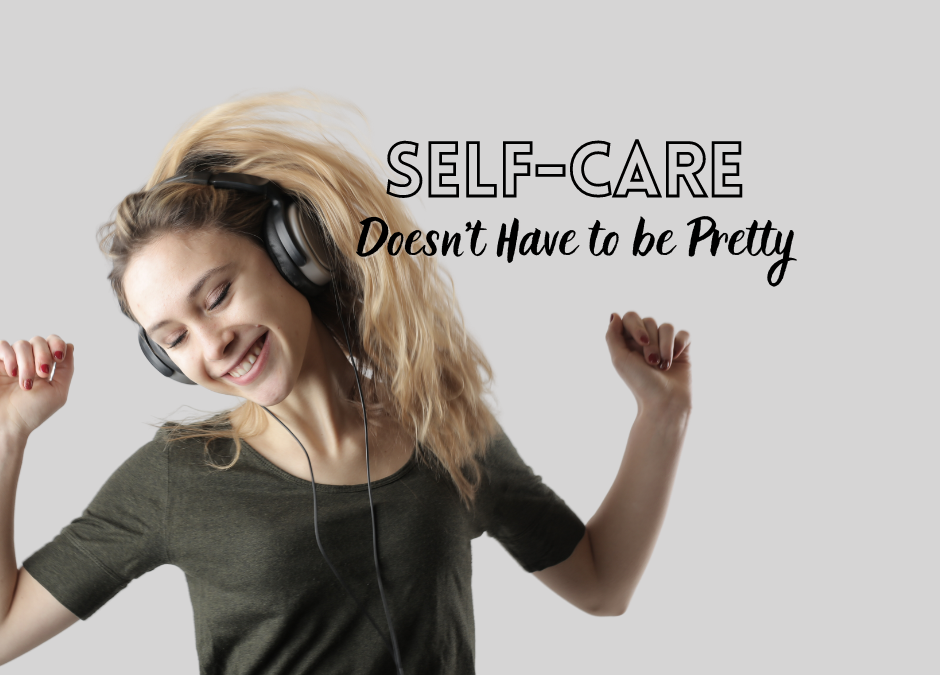2020, man. If nothing else, this is the year that we have learned just how essential self-care is to our sanity. And, for most of us, we’ve learned it by default… by taking away those habits and seeing what kind of chaos happens as a result.
Sounds like a risky experiment, but we’re in it anyway.
So we know that this pandemic has thrown our self-care habits out the window, but are we sure we even realize which habits were helping us?
Let me explain. When someone talks about the need to “do more self-care,” that often conjures up images of getting our nails done, or having a massage, or soaking in a bubble bath. Of course these things are pleasant to most of us, but do these activities actually make a difference in how we feel once they’re over? And even if they do make us feel better a bit, are they enough?
When we think about caring for our children, most of us recognize the job as multi-layered. Of course there’s the physical needs we need to tend to, but equally as important are the social and the emotional needs. We need to help our babies feel connected to us, we need to help them feel loved, and we need to help them feel safe.
So when we apply that mentality towards caring for ourselves, it should come as no surprise that our needs extend beyond the physical into the social, emotional, and the spiritual. This means that true self-care isn’t always beautiful. Sometimes it involves wearing the ugliest/comfiest clothes we own because they allow us to connect to comfort. Sometimes it involves releasing the tears that have built up within us (even if that means a lot of snot comes out with it). Sometimes self-care involves making others unhappy, because saying no is the truest way we can tend to our own needs.

True self-care isn’t about what LOOKS good. It’s about what FEELS good. What follows is a list of ideas that target each of these four different variations of self-care. Read through and take note of those ideas that register or call to you.
PHYSICAL SELF-CARE
- Put on the comfiest, stretchiest clothes you own
- Give your skin a break from makeup and perfumes
- Let your face and your body show your true feelings
- Move your body (exercise, stretch, play, dance, swim, clean)
- Eat well (ask yourself what would nourish you prior to selecting a food)
- Prioritize sleep (nothing goes well when we are exhausted. Prioritize this need when possible)
- Strive for consistent sleep and eating patterns to help regulate your biological rhythms
- Let your body make the sounds and movements it wants to (with no care for how it looks or sounds)
- Seek out physical affection from loved ones (and hold the embrace as long as you need!)
- Provide gently and loving touch to yourself
SOCIAL SELF-CARE
- Recognize that your social needs ebb and flow (Some days you need social interaction, some days you need alone time)
- Set boundaries (Say no to people and social situations that don’t serve you. If something causes you anxiety just thinking about it, and that anxiety is rooted in realistic concerns (versus an overgeneralized anxiety response), allow yourself to say no)
- Find your middle ground in social interactions (what is the right balance for YOU between saying yes to socializing and saying no? What are areas where you feel good to say yes, what are areas you feel better to say no?)
- Identify people in your life that lift you up and find ways to engage with them safely (social distanced walks, zoom calls, quarantine buddies)
- Take advantage of the relationships within your immediate family by spending quality time
- Optimize your social interactions by staying present and removing distractions (put those phones away!!!)
- Express gratitude for the people in your life who support you
- Evaluate your relationships and cut ties or create further distance from those who add to your stress
- Connect to loved ones who have died through prayer, letters, remembering, talking to them, and looking at photos
- Express your feelings and appreciation to your loved ones whenever you can

EMOTIONAL SELF-CARE
- Validate your own feelings (ex: “It makes sense that I feel this way because…”)
- Engage in calming strategies (yoga, meditation, mindfulness, breath work, etc)
- Release your feelings in appropriate ways (talking, crying, writing, drawing, exercise)
- Take social media breaks when needed
- Block accounts on social media that don’t serve you
- Talk to trusted others about your feelings (Not just the negative situation, but how you actually feel about it)
- Modify unhelpful thoughts (Ask yourself 1. Is this true? 2. What evidence supports and contradicts my thought?)
- Participate in therapy to gain reliable and consistent support
- Allow yourself to take a break, take a walk, or take a vacation whenever you feel like you need it
- Stop allowing irrational guilt to have power over your life
- Take charge of irrational feelings by doing the thing anyway (it will be hard at first, but little by little it will get easier)
- Stop self-criticism
SPIRITUAL SELF-CARE
- Practice mindfulness and meditation
- Read texts that connect you to your spiritual beliefs
- Maintain a “bigger picture” even when you’re in the heat of the moment
- Stay connected with nature
- Lay down in the dirt
- Practice gratitude
- Learn from others
- Give to others
- Participate in a community (even if from afar)
- Connect to your senses
- Allow yourself time for creativity
Did you find anything here that appeals to you? When thinking about self-care, a helpful place to start is to ask yourself these questions:
What am I feeling?
What do I need right now?
What would help me feel better in the long run?
The answers to these questions might lead you to choose different strategies to care for yourself than had you blindly followed the old cliche list of self-care ideas. Because self-care, as the name implies, is an inherently personal experience. It cannot be a one-size-fits-all process. We all have different stressors, different temperaments, different thresholds, different sensory preferences, different social needs. It is only by paying attention to our unique internal experience AND LISTENING that the entire concept of self-care will have any value to us at all.
QUICK LINKS:
The Upside of Conflict
How to Avoid Passing Down Problems to Your Child
___
Dana Basu, PsyD is a licensed clinical psychologist at EverGROW therapy and founder of Everything But Crazy, an online resource for parents. She provides individual therapy, support groups, and online resources for parents in Orange County and throughout the state of California via online therapy. She specializes in working with the highly sensitive person and people with difficult childhood experiences, trauma, parenting stress, and chronic guilt.

